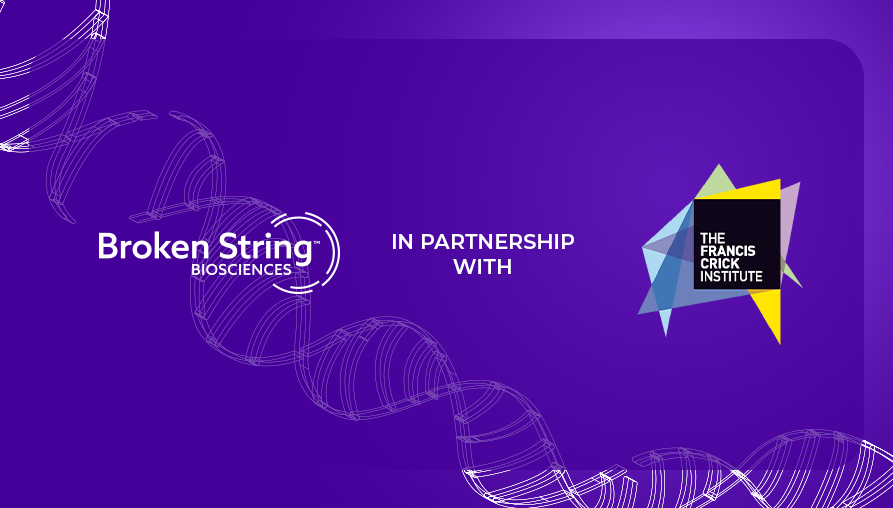Channels
Special Offers & Promotions
Broken String Biosciences and the Francis Crick Institute collaborate to advance ALS research

Partnership to expand applications of DNA break-mapping technology and advance understanding of genomic instability in development of the neurodegenerative disease amyotrophic lateral sclerosis
Broken String Biosciences (“Broken String”), a genomics company driving development of the next generation of more precise, safe, and effective cell and gene therapies, has announced it has entered a research collaboration with the Francis Crick Institute, a world-leading biomedical discovery institute dedicated to understanding the biology underlying health and disease.
In partnership with leading researchers at the Crick, the project aims to develop novel applications for Broken String’s proprietary DNA break-mapping platform, INDUCE-seq™, beyond its established capabilities in gene-editing. The research will be focused on leveraging the technology to investigate the impact of genomic instability in the development of amyotrophic lateral sclerosis (ALS). ALS is a progressive and debilitating neurodegenerative disease, causing gradual loss of the ability to control voluntary movements and basic bodily functions.
The collaboration is focused on understanding the contribution of genome stability to ALS, combining the interests of Prof Simon Boulton and Dr Nishita Parnandi at the Crick focused on genome stability and DNA double-strand break (DSB), with Prof Rickie Patani and Dr Giulia Tyzack, interested in understanding the underlying mechanism of ALS disease mechanism. Recognizing the utility of the novel INDUCE-seq platform developed by Broken String’s R&D team, led by Professor Simon Reed, the Crick and Broken String teams aim to collaborate to demonstrate and further validate the INDUCE-seq technology in this setting.
The majority of ALS cases (~90%) are considered sporadic. Whilst there has been progress to better understand the genes and biological markers associated with the disease, very little is understood about the causes, with current treatment strategies focused on symptom management and slowing disease progression. Combining world-leading research from the Crick with Broken String’s expertise in genomics, sequencing, and bioinformatics, the partnership provides a unique opportunity to expand application of the Company’s INDUCE-seq technology in a key area of clinical unmet need, to support improved diagnosis and treatment of ALS.
The partnership has been secured via the Francis Crick Institute’s Business Engagement Fund, a new initiative supported by The Medical Research Council (MRC-UKRI), that is designed to encourage collaborations with small-to-medium sized enterprises (SMEs) and strengthen the Crick’s engagement with industry.
Dr. Simon Boulton, Principal Group Leader, the Boulton Lab (DSB Repair Metabolism) at the Francis Crick Institute, said: “Our research is focused on exploring how cells repair damage to their DNA, and how failures in this process lead to disease. Following exploratory work with Professor Reed, we were keen to collaborate with Broken String. We are excited to leverage the INDUCE-seq platform’s unique capabilities in directly measuring and quantifying DNA double-strand breaks, and applying this to deepen our understanding of diseases that have genomic instability as a contributing factor, such as ALS.”
Felix Dobbs PhD, CEO, Broken String Biosciences, commented: “This collaboration with the Crick Institute is validation of our differentiated approach to DNA break-mapping; enabling our team to support world-leading research with insights provided through our INDUCE-seq platform. It demonstrates a fantastic opportunity to apply our expertise across other key research areas to support the advancement of human health.” He added: “There is an unmet clinical need for effective ALS treatments, as well as strategies for earlier diagnosis that can significantly improve patient outcomes. We look forward to working closely with Dr Boulton and Professor Patani’s groups to support this critical research area and continue building out our application focuses.”
About Broken String Biosciences
Broken String Biosciences is a genomics company with a mission to advance the next generation of more precise, safe, and effective cell and gene therapies through its cutting-edge technology platforms.
The Company’s core technology, INDUCE-seq™, is a Next Generation Sequencing (NGS)-based DNA break mapping platform that enables companies developing cell and gene therapies to measure and quantify off-target genetic edits, and evaluate the associated genetic outcomes. The platform technology provides data-driven, actionable insights across the discovery, pre-clinical and clinical development stages to advance gene editing programs.
Broken String Biosciences was spun out of Cardiff University in 2020 and completed a six-month residency at the Illumina Accelerator in Cambridge, UK. The Company has raised financing of $20m USD to date from venture capital investors.
About The Francis Crick Institute
The Francis Crick Institute is a biomedical discovery institute dedicated to understanding the fundamental biology underlying health and disease. Its work is helping to understand why disease develops and to translate discoveries into new ways to prevent, diagnose and treat illnesses such as cancer, heart disease, stroke, infections, and neurodegenerative diseases.
An independent organisation, its founding partners are the Medical Research Council (MRC), Cancer Research UK, Wellcome, UCL (University College London), Imperial College London and King’s College London.
The Crick was formed in 2015, and in 2016 it moved into a brand new state-of-the-art building in central London which brings together 1500 scientists and support staff working collaboratively across disciplines, making it the biggest biomedical research facility under a single roof in Europe.
Media Partners


